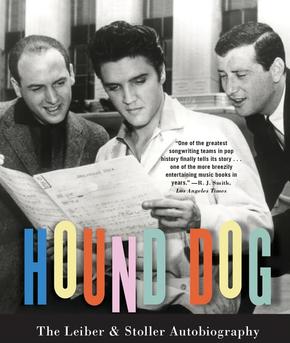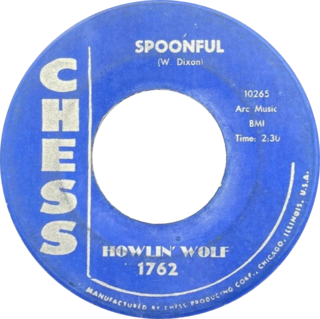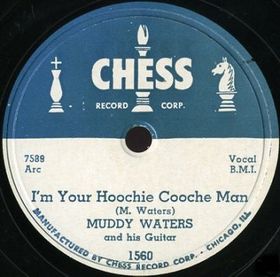
Alexander James Harvey was a Scottish rock and blues musician. Although his career spanned almost three decades, he is best remembered as the frontman of the Sensational Alex Harvey Band, with whom he built a reputation as an exciting live performer during the era of glam rock in the 1970s.

Leiber and Stoller were an American songwriting and record production duo, consisting of lyricist Jerome Leiber and composer Michael Stoller. As well as many R&B and pop hits, they wrote numerous standards for Broadway.

Willie Mae "Big Mama" Thornton, was an American singer and songwriter of blues and R&B.

"Hound Dog" is a twelve-bar blues song written by Jerry Leiber and Mike Stoller. Recorded originally by Big Mama Thornton on August 13, 1952, in Los Angeles and released by Peacock Records in late February 1953, "Hound Dog" was Thornton's only hit record, selling over 500,000 copies, spending 14 weeks in the R&B charts, including seven weeks at number one. Thornton's recording of "Hound Dog" is listed as one of the Rock and Roll Hall of Fame's "500 Songs That Shaped Rock and Roll", ranked at 318 in the 2021 iteration of Rolling Stone's 500 Greatest Songs of All Time and was inducted into the Grammy Hall of Fame in February 2013.

Un-Led-Ed is the debut album by Dread Zeppelin, released in 1990. The album received a public endorsement by Led Zeppelin vocalist Robert Plant, who claimed he preferred Dread Zeppelin's cover of "Your Time Is Gonna Come" to the Led Zeppelin original.
The Sensational Alex Harvey Band were a Scottish rock band formed in Glasgow in 1972. Fronted by Alex Harvey accompanied by Zal Cleminson on guitar, bassist Chris Glen, keyboard player Hugh McKenna and drummer Ted McKenna, their music was a blend of blues rock and hard rock, with cabaret elements. Their stage performances incorporated theatrical elements. The band were popular in continental Europe, and influential in Australia, most notably on AC/DC and on the young Nick Cave and his first band The Boys Next Door.

Hoy-Hoy! is a Little Feat collection released in 1981 two years after the band's break-up following the death of founder Lowell George. Originally released as a double album and later a single CD, it contains alternate versions and live recordings of many Feat tracks as well as some previously unreleased material. The cover is illustrated by Neon Park.

"Kansas City" is a rhythm and blues song written by Jerry Leiber and Mike Stoller in 1952. First recorded by Little Willie Littlefield the same year, as "K. C. Loving", the song later became a chart-topping hit when it was recorded by Wilbert Harrison in 1959. "Kansas City" is one of Leiber and Stoller's "most recorded tunes, with more than three hundred versions", with several appearing in the R&B and pop record charts.

"Spoonful" is a blues song written by Willie Dixon and first recorded in 1960 by Howlin' Wolf. Called "a stark and haunting work", it is one of Dixon's best known and most interpreted songs. Etta James and Harvey Fuqua had a pop and R&B record chart hit with their duet cover of "Spoonful" in 1961, and it was popularized in the late 1960s by the British rock group Cream.

"Hoochie Coochie Man" is a blues standard written by Willie Dixon and first recorded by Muddy Waters in 1954. The song makes reference to hoodoo folk magic elements and makes novel use of a stop-time musical arrangement. It became one of Waters' most popular and identifiable songs and helped secure Dixon's role as Chess Records' chief songwriter.
The Syndicats were an English beat band formed in September 1963 in North London with Thomas Ladd on vocals, Steve Howe on guitar and backing vocals, Kevin Driscoll on bass and backing vocals, Jeff Williams on organ and piano, and John "Truelove" Melton on drums. The latter was replaced by Paul Holm on their last single in 1965. This was Steve Howe's first group. When he left The Syndicats to join the band The In Crowd in November 1965, he was replaced by guitarist Ray Fenwick, who was subsequently replaced by Peter Banks. Banks went on to be the first guitarist in Yes, and was then replaced by Howe in 1970.
"Is That All There Is?" is a song written by the American songwriting team Jerry Leiber and Mike Stoller. It became a hit for the American singer Peggy Lee in 1969. The song was originally performed by Georgia Brown in May 1967 for a television special. It was first recorded by disc jockey Dan Daniel in March 1968, but this was an unauthorized recording that went unissued at the songwriters' request. The first authorized recording was by Leslie Uggams in August 1968.

Live was the first live record by The Sensational Alex Harvey Band, released in 1975. It features a cover version of the Tom Jones song "Delilah". Donald A. Guarisco of AllMusic writes "Live is a double-triumph for the Sensational Alex Harvey Band because it functions both as a strong live souvenir for the group's fans and also as a solid introduction to the group's highlights for the novice".

Zalvation: Live In The 21st Century is a live album, released in 2006, which served as a The Sensational Alex Harvey Band reunion notwithstanding that Harvey himself had died in 1982. This was the third SAHB album to be made without Alex Harvey, the others being the band's seventh studio album, Fourplay and another reunion album Live in Glasgow 1993. This album features Max Maxwell on vocals, and sees the return of Hugh McKenna to the band, his last appearance being on the Fourplay album, for which he had been vocalist. The album commemorated a reunion tour, but was also intended as a farewell tour; however the tour had been so successful that the band decided to continue. The album release contains 2 CDs and comprises new versions of songs written or covered by the original SAHB. Although four fifths of the group on Zalvation were responsible for 1977's SAHB album Fourplay, no songs from this album are included.

Alex Harvey and His Soul Band is the debut album by Alex Harvey accompanied by his Soul Band. It was originally released in 1964 on vinyl, and was re-released on vinyl in Germany in 1985 or 1986. The 1999 release is a compilation of 20 unreleased songs of the Soul Band, including two songs recorded before the debut album. The album is available on CD.

Roman Wall Blues is the first solo album by Alex Harvey made after the Soul Band, and his time in the Hair pit band. This album was released in 1969 and contains one song from Hair ("Donna"), plus some Harvey originals, ; that he later re-record with The Sensational Alex Harvey Band. The title track was a couplet sonnet by W.H. Auden about the life of a Roman soldier.

Drive is the fourteenth and final solo album by English singer Robert Palmer released in 2003. Critics hailed it as the grittiest and most heartfelt album of Palmer's career.

Covers is the eighteenth studio album and the first covers album by singer-songwriter James Taylor released in 2008. The album was recorded with his regular touring band. Some of the tunes Taylor had been performing off and on in concerts for years, while others were new to his repertoire. It received general positive reviews and two Grammy Award nominations.

Muddy "Mississippi" Waters – Live is a live album by Muddy Waters, released in January 1979. It was recorded during the 1977–78 tour to support Muddy Waters' album Hard Again (1977) and features the same musicians, including James Cotton and Johnny Winter, who had produced the album.
Framed is a song written by Jerry Leiber and Mike Stoller. It was originally recorded by The Robins in August 1954, in Los Angeles and released on Leiber and Stoller's label Spark Records in October of that year as the B side of Loop De Loop Mambo. Jerry Leiber talks about the song, saying, "Another rap took the form of a police drama. We called it "Framed" and gave it a subtext that, despite the humor, refers to the legal brutality that impacted the black community".
















